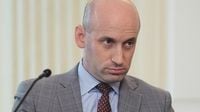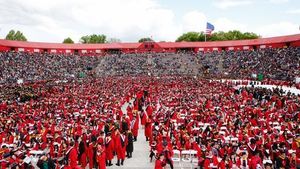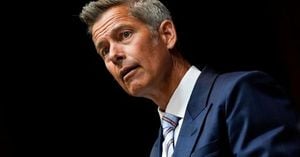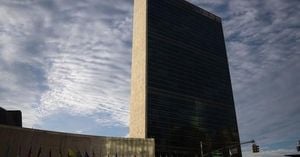Stephen Miller, the White House deputy chief of staff for policy and a longtime architect of President Donald Trump’s most hardline immigration and law enforcement initiatives, has emerged as a central—and controversial—figure in the administration’s recent deployment of federal law enforcement and National Guard troops into Democratic-led cities. His outsize influence and incendiary public rhetoric have sparked heated debate, legal challenges, and mounting tension between the federal government and local officials, especially following a chaotic confrontation in Chicago that left a local woman, Marimar Martinez, wounded by a federal agent.
According to CNN, the confrontation in Chicago last week became the catalyst for the White House’s decision to prepare for a National Guard deployment. In the immediate aftermath, Miller issued an urgent directive to Department of Defense personnel: “Prepare to send in the troops.” Federal officials claimed that local police were refusing to provide backup, a claim firmly denied by the Chicago Police Department, which insisted officers responded promptly. Miller, however, seized on the moment, labeling the unrest “domestic terrorism and seditious insurrection” in a social media post and positioning the federal response as a necessary show of force against what he described as an existential threat to law and order.
“The struggle that is taking place right now is between the lawful exercise of power by the American people through a duly elected government, versus the unlawful exercise of street violence in the form of domestic terrorism,” Miller told reporters earlier this week, as cited by CNN. “We see this playing out over and over and over.”
Miller’s remarks and actions have not gone unnoticed. During a CNN interview on October 6, 2025, he asserted that President Trump had “plenary authority” under Title 10 of the U.S. Code to deploy the National Guard to cities like Portland, Oregon. “Under Title 10 of the U.S. Code, the president has plenary authority,” Miller declared, before abruptly pausing due to a technical glitch with his earpiece. The term “plenary authority”—meaning total and absolute power—is rarely used by administration officials in this context and drew immediate scrutiny from legal experts and political commentators alike.
When pressed by CNN host Boris Sanchez on whether Trump would abide by a federal judge’s expanded ruling that bars him from ordering troops from any state into Portland, Miller sidestepped the phrase in his response, instead emphasizing the president’s ability to federalize the National Guard when federal resources are insufficient for public safety. However, legal scholars were quick to challenge Miller’s interpretation. As University of Michigan law professor Richard Primus told HuffPost, “The president does not have plenary authority over the National Guard.” He explained that the president’s authority is constrained by Congress and federal law, which allow deployment of troops domestically only under specific conditions—such as an attack, rebellion, or when regular law enforcement cannot execute the law.
Brian Frazelle, deputy chief counsel of the Constitutional Accountability Center, further clarified to HuffPost that while the Constitution and federal law do grant certain plenary powers to the president, these are narrow and subject to statutory limits. “There wouldn’t be much sense in Congress establishing conditions like that in the statute if a president could completely ignore them without any check by the courts,” Frazelle said, expressing concern over Miller’s expansive view of executive authority.
Despite these legal challenges, the Trump administration has pressed forward. Federal judges have already blocked Trump from deploying the National Guard to Portland, citing the absence of the necessary legal conditions, and are currently weighing similar challenges to the Chicago deployment. Nevertheless, Miller has remained defiant, characterizing judicial orders as a “legal insurrection” and vowing to find ways to circumvent restrictions, including the potential invocation of the Insurrection Act—a move that would grant the president sweeping powers to federalize the Guard and dispatch the military into American cities.
As CNN reports, Miller’s aggressive stance has not only put him at odds with local officials, who accuse federal agents of provoking confrontation, but has also alarmed some within the Trump administration and among congressional Republicans. While allies praise Miller’s effectiveness as a messenger and his unwavering dedication to Trump’s vision, others privately express concern that his militant language and go-it-alone approach risk alienating voters and creating political fallout that lawmakers are left to manage.
Illinois Governor JB Pritzker has been among the most vocal critics, accusing the federal government of provoking unlawful actions. Yet Miller has doubled down, publicly accusing Pritzker of providing “aid and comfort” to protesters he labels as domestic terrorists. President Trump himself has echoed Miller’s rhetoric, calling for Pritzker and Chicago Mayor Brandon Johnson to be jailed. “I’ve seen the law, and when you have a group of people where the police call off the safety for ICE officials—I’ve understood that, and I’ve read it today in numerous journals—that that’s illegal,” Trump said on October 8, 2025, as reported by CNN.
White House officials, including press secretary Karoline Leavitt, have lauded Miller as “one of President Trump’s most trusted and longest serving aides for a reason—he delivers.” The administration credits Miller’s dual roles as deputy chief of staff for policy and homeland security adviser for his broad influence over federal initiatives, from mass deportation efforts to anti-crime crackdowns in cities like Chicago, Portland, and potentially New Orleans. Miller’s reach even extends into foreign policy, where he and Secretary of State Marco Rubio reportedly oversee counter-drug missions involving military action in the Caribbean.
Within the administration, Miller is often referred to as “the prime minister”—a testament to his singular driving force behind a constellation of federal actions that have reshaped US policy and society. His influence is so pronounced that, according to sources cited by CNN, President Trump frequently waits for Miller’s input before making final decisions on major policy moves.
Yet, not all in Trump’s orbit are comfortable with the power Miller wields. Retiring North Carolina Republican Senator Thom Tillis remarked, “I don’t fault him for trying, but just because he tried doesn’t mean it’s legitimate,” referencing Miller’s persistent advocacy for norm-breaking initiatives even after court intervention. Meanwhile, some members of the Main Street Caucus have sought greater clarity on Miller’s deportation strategies, only to be met with vague responses.
Despite the controversy, Miller’s relentless pursuit of Trump’s agenda has earned him both grudging respect and deep unease across the political spectrum. Legal battles over the scope of presidential authority are likely to continue, with the White House signaling its intent to fight restrictions all the way to the appellate courts. As the nation watches these high-stakes confrontations unfold, one thing is clear: Stephen Miller’s influence on the direction of federal power—and the debate over its limits—has never been more pronounced.







